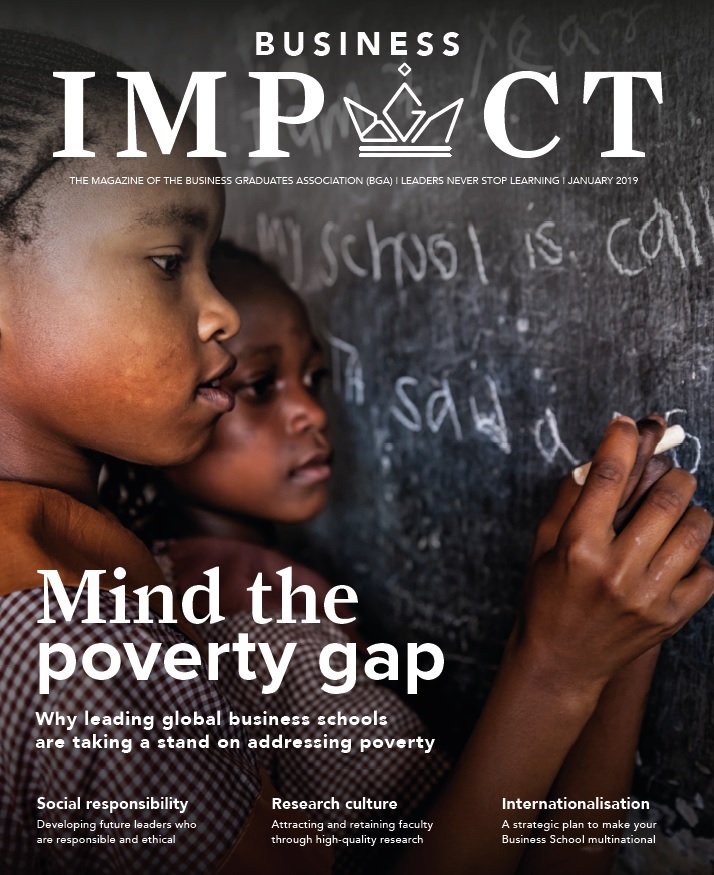You must login/create an account to view this content
How to get a job, using cognitive science
You must login/create an account to view this content
Waiting for Godot: treading the boards of the great Brexit drama
Waiting for Godot: treading the boards of the great Brexit drama


In April 2019, Xavier Bettel, Prime Minister of Luxembourg, remarked that waiting for Brexit is a bit like waiting for Godot. In Samuel Beckett’s famous play, the central characters stay and wait for somebody (Godot) who never quite materialises. Moreover, their long and painful wait is characterised by bickering and disagreement. One gets the connection to Brexit as well as the good humour that extends from the fact that Waiting for Godot was originally written in French. Plus, before anybody screams ‘backstop!’, it’s worth mentioning that the English version of the play is often played out with the central characters depicted as two Irishmen.
Three years on from the UK’s EU referendum, we still wait for a Brexit process outcome. Theresa May’s resignation and a pending summer recess with a new Tory leader will not speed things up much. Halloween (31 October 2019) awaits the UK and EU as a self-imposed deadline. A game of ‘trick or treat’ looks inevitable.
Over these three torturous years, the UK’s business schools have had time to eat, breathe and sleep Brexit. Few, if any, have expressed joy at its choice or impact and most have lobbied for a softer variant or its abandonment. This position has tended to reflect a majority view that continued EU membership is the best platform for the sector’s growth and future success.
In one of its early pronouncements on the subject, the UK’s Chartered Association of Business Schools (CABS) declared: ‘We can’t change the outcome of the referendum but we need a good deal if we are to avoid seriously adverse consequences.’ Behind such a careful statement is a community of business schools that would tend to believe that Brexit is a setback, the scale of which will reflect the nature of the final exit deal. Across the sector, business school deans have queued up to couple cries of resilience with admission that leaving the EU hurts the UK’s ability to attract the best students, researchers and academics from across Europe.
Brexit fears and impacts
What underpins opposition and/or suspicions over Brexit? To answer this question, we have to look at the current situation and benefits of EU membership.
At the moment, higher education (HE) institutions in the UK can recruit the best European academic talent with relatively little restriction. Over 20,000 European nationals work in the UK’s HE sector on a visa-free basis. Among these are outstanding academics and professionals making great service to UK institutions. In many disciplinary fields, this supply line is vital to the educational offerings and reputation of UK institutions.
On the other side of the staff-student relationship, the UK currently attracts EU nationals to study here with few obstacles or barriers. There are close to 140,000 fee-paying degree students from continental Europe in the university sector alone, making up about one quarter of its global international student population. As a full EU member economy, the UK can match its appeal as a high-quality, English-speaking sector with a fee and access regime that positions EU nationals favourably when compared to other international students.
With EU nationals treated as if they were home students, they pay lower fees and can study on UK-based degree programmes without visas. They can secure loan financing for their UK-based studies (as if they were UK nationals) and enjoy a right to stay and work in the UK after graduation. On top of this, there are around 20,000 UK citizens studying elsewhere in Europe for a degree at lower continental fee levels and a similar number of British exchange students funded each year under the Erasmus+ mobility programme. For younger people, this is one of the primary symbols of the UK’s EU membership.
Finally, as a highly competitive and impactful sector, the UK’s transnational education (TNE) strategies are very much aided by single market freedoms with considerable scope for growth in such activity. Campus implantation is easier in a context of regulatory alignment than regulatory divergence, as are other forms of award-based collaboration. Our research strategies are intrinsically linked to EU funding regimes and programmes. We presently enjoy full participation and access rights to Horizon 2020, with an excellent funding and participation rate. EU-funded research projects and initiatives have been the source of vast funding for research in UK institutions and are playing a vital role in enabling and scaling collaborative research across European borders. Programmes of this type build relationships and interdependencies that naturally span out into other forms of institutional co-operation. In addition, the EU’s structural funds have enabled many universities and their Business Schools to develop infrastructure and capacity.
The threat of Brexit
Are all the above benefits really at threat? If we consider what happens in a ‘hard’ or ‘crash-out’ Brexit, some of these established benefits look to be at risk. In terms of access for EU students and workers, basic legal rights of access would change dramatically. Students would be treated like other international students in terms of visa requirements and would almost certainly face higher fees and new visa-based access requirements.
UK higher education is renowned for its two-tier pricing model with international students already facing higher study fees, visa requirements (and costs), and restrictions on post-study work. This would be the new reality for EU nationals studying in the UK and one could lead to a decline in demand. The Department for Education (DfE) is said to be preparing for higher fees for new EU students from as early as 2020. Academics and professionals taking up work in UK higher education would require visa sponsorship, which amounts to an administrative nuisance and (small) extra cost to all parties.
The UK would also be outside Erasmus+ and forced either to buy in, or to set up new bilateral exchange schemes. On top of this, there would be no ‘pay-outs’ from EU structural funds to part support infrastructure and capacity projects at institutions in eligible UK regions. Outside the EU, the UK moves from a position of centrality within impactful Horizon 2020 research programmes to life on the outside. In the face of competing investment priorities at national level, there is no certainty that current EU funding levels would be matched by substitute schemes.
A softer variant of Brexit would arguably soften the blow, especially one with a commitment to preserving freedom of movement for young people for the purpose of education and training. In this scenario, one would envisage bilateral protocols between the UK and the EU in keeping with those concluded between the EU and Switzerland.
Specific agreements would, of course, need to be negotiated and implemented. These would almost certainly maintain some of the current freedoms and benefits enjoyed under EU membership but this would be a menu-based approach with agreement to be struck on fees, rights of residence, post-study work entitlements, participation in the successor programme to Horizon 2020, Erasmus+, and mutual recognition of qualifications and diplomas.
Life beyond Brexit
Of course, the strength and resilience of the UK higher education sector must be taken into full account, as must the arguable benefits of a more independent path. Set against the so-called `Brexit penalties’ are the Brexit dividends as seen or understood by its supporters. Taking a narrow view of potential reform to HE and immigration, UK institutions could expect higher per capita fee income from EU students and a potential reduction in the burden of student loan financing previously open to EU nationals, for which recovery rates are staggeringly low.
UK institutions have proven their ability to continue to attract international students in high number despite relatively high fee levels and even when visas supposedly function as an administrative barrier or psychological deterrent. The logic runs that if the product or service is good enough, demand will endure.
Pending immigration reforms driven by Brexit also extend the period of time that international graduates can stay in the UK in order to secure graduate-level work after completion of their studies. Planned rules will increase the time period international graduates are permitted to stay after graduation, from four months to six months, with a full year in prospect for PhD graduates. If this legislation comes onto to the statute books, then Brexit will arguably have improved the post-study work entitlements of half a million international students.
Brexit supporters will also remind us that whatever money is redistributed back to UK universities and business schools through EU projects and programmes pales into insignificance when compared to global net contribution. There is also broad assumption that substitute schemes will emerge at national level and with significant funding. Outside the formal structure of the EU, it is clear that UK-based business schools and researchers will find ways to collaborate with their European counterparts too.
Effects and impacts
Although the Brexit process has yet to come to a conclusion and the ‘end state’ remains unclear, it is abundantly clear that its effects are already being felt. One quick win for the UK sector has been the fall in the value of the pound on international currency markets, which has had the effect of making UK study more affordable; a sort of Brexit premium.
Application and registration rates have held up, at least for now, although the fast rate of growth in EU applications for undergraduate courses experienced prior to the referendum has been lost. There are EU nationals on faculty and in administration teams across our institutions upset at developments and concerned over their future status. The ‘settled status scheme’ introduced by the government has allayed certain fears but the introduction and management of that scheme has attracted widespread criticism.
A significant number of EU staff and academics have left UK institutions citing Brexit as an influence on their decisions and applications for new posts have changed in profile for many institutions with a relative decline in applications from continental European academics. Some students have been confused about the extent and timing of rule changes that might affect them, especially as a whole series of supposed ‘independence day’ dates have come and gone. They and prospective entrants have faced uncertainty over the nature and timing of fee-related decisions as the UK has stumbled through without certainty over the start dates for new rules and regimes.
Worries across UK higher education about future Erasmus+ and Horizon 2020 participation, have been linked to more immediate effects. Organisations across Europe have indicated that uncertainty about the UK’s continued involvement in European programmes is already causing problems. These include sharp falls in secured funding and requests for UK institutional/researcher involvement in Horizon 2020 project bids and applications.
But in a sense, we leave the biggest issue to last. Like other service businesses, the industry is better placed if the market is healthy and performing strongly. The first concern here is the most obvious one. Brexit is an assumed factor in the UK’s weakening growth rate. Apart from the knock-on effect on spending and earnings, there is ample evidence of Brexit-influenced relocation decisions. This may not amount to a ‘Brexodus’ of firms and jobs but there is a growing impact on the UK graduate jobs market, especially in areas such as banking and finance. After a bumper year for graduate jobs in 2015-2016, plans for graduate hiring by top employers have been downgraded. One annual survey (by research firm, High Fliers) has found an average 10% annual cut in graduate recruitment by private sector employees in the first two years subsequent to the EU referendum. Moreover, the requirement for firms to ride out Brexit uncertainties and fund expensive contingency plans is leading to short-term suspensions on investment decisions, for example, into management development training and/or commissioned research.
A final thought
As we await the final act of the great Brexit drama, it remains unclear what sort of sector the UK will finally have. One embedded firmly in the European Higher Education Area and subject to the full body of EU law, one connected to this area through some sort of independent deal, or one that is fully on the outside of it? The curtain falls on Beckett’s drama without Godot’s arrival. Luxembourg may be a tiny state but its Prime Minister might just have found the perfect way to depict and conceptualise this protracted Brexit drama.
Simon Mercado is Professor of Management and Campus Dean/Director for ESCP Europe Business School in London (UK).
Read more Business Impact articles related to geopolitics

Strong rebounds set to fuel opportunity in Latin America
Latin America has responded strongly to the impact of Covid-19 and has the potential to become a global hub for entrepreneurship and innovation, says Gregorio Esteban

Why Latin America’s influence is set to grow
Latin America is poised to play a greater role on the world stage, as countries reassess trade relationships and take stronger stances on climate change, says Gregorio Esteban. Business leaders should take note

How business schools can bridge the political divide: part II
Business schools can no longer afford to ignore the intimate interrelationship between business and politics – and they must go beyond layering ESG perspectives onto standard business thinking – says Joe Zammit-Lucia
Want your business school to feature in
Business Impact?
For questions about editorial opportunities, please contact:
Tim Banerjee Dhoul
Content Editor
Business Impact

Share this page with your colleagues
Winning at interview and preparing for AI-infused recruitment
If your CV was good enough to get you an interview, that’s great, but looking good on paper is just the starting point. At interview, you have to demonstrate that you have the skills to do the job and will be a good fit with the team.
Your audition
An interview is an audition – your opportunity to shine and prove you are the perfect person for the role. The actor Harlan Hogan is famous for delivering the catchphrase, ‘you never get a second chance to make a first impression…’ and it certainly pays to be well prepared.
The interview is not, however, just an exercise in self-promotion. The hiring manager has a specific brief and, in effect, you are there to convince the interviewer that you can solve their hiring problem. An interviewer will focus on gaining an understanding of you and your motivation and how these fit with the role, existing team and organisational culture.
Be prepared to show how you will add value and that you are the best candidate to help the organisation succeed. When you are asked to tell the interviewer about yourself, what this request really means is that you should show ‘what value would you bring to us?’
Thorough preparation and the way in which you present yourself are crucial to success; but, since performance at interview is not a reliable indicator of job performance, interviews these days tend to be quite structured and often concentrate on competencies with targeted behavioural questions.
The basics
Clarity and brevity are your touchstones. Show you are articulate and able to think on your feet while communicating effectively under pressure. Be ready to provide work-related examples that show your personality and how you operate and illustrate that you will be a good fit in the role. Ensure you pinpoint your strengths and expertise and emphasise your points with examples that showcase your achievements. Show how you will make a real difference when you are appointed.
You may be asked some tricky questions as interviewers probe to assess how you react. Keep your answers concise and relevant. You are likely to be asked competency-based questions relating to your previous roles, so make sure you have plenty of examples prepared.
Employability skills are also an important factor for success at work and showing that you have these skills and focusing on them during the interview process, along with your technical expertise, will help differentiate yourself from the competition. Concentrate on showcasing good communication skills, commercial awareness, a commitment to lifelong learning, problem-solving skills, and professional manner and attitude.
Demonstrating your skills at interview is not easy and we all have ‘off days’ but interview practice will help. If you can, get a friend, colleague, career coach or mentor to help with some sessions to rehearse your responses, improve your confidence and hone your performance.
The changing face of recruitment
HR now use robotics to enhance and expedite the recruitment process and leave hiring managers free to concentrate on more complex tasks. AI is supposed to remove human biases that adversely affect some candidates and it seems that nearly all Fortune 500 companies are using some form of automation to enhance hiring processes.
It’s interesting to consider what changes job seekers are likely to see as robots are used in the interview process more often. A large Swedish recruitment specialist, TNG, has been experimenting with such a system to offer candidates job interviews that are free from the unconscious biases that managers and recruiters may bring to the hiring process. The idea is to make the experience ‘seem human’ while ‘background-blind’ AI programmes manage tests and perform initial online interviews.
The robot interview doesn’t indulge in pre-interview small talk and asks all questions in an identical way, in the same tone, and typically, in the same order. This is believed to create a fairer and more objective interview. Recruiting managers are then provided with transcripts of the interviews so they can decide which candidates to move to the next stage of the process, based on their answers alone.
Impressing the algorithm
Interviewees can’t relax too much in this context as the AI programme records and analyses responses, and where there is a video interface, monitors facial expressions. Some candidates will find they are comfortable with such an interview, as they will perceive it as a non-judgmental, non-threatening and non-invasive means of interaction which affords them scope for presenting themselves in a relaxed manner. Others may find talking to a screen and recording their answers more challenging.
There is some discussion around the issue of bias and AI. After all, the algorithms at work here are programmed by people who have flaws, biases and preconceptions that are all too easily inherited by an AI system. That said, many candidates seem happy with these developments. Randstad, a Dutch multinational recruitment firm, found that a majority of US job candidates believe technology, AI included, has made applying for jobs more efficient. These same candidates also felt more respected and engaged in the recruitment process as they received automated updates.
Impressing a robot at interview may require candidates to adjust their focus. Answering questions that will be analysed by an algorithm means your responses must focus on the job specification, using words and phrases directly related to the role. You cannot rely on building rapport with the interviewer because a robot is not interested in bonding with you. It will still be important to be well prepared for the interview, having read not just the job description but also the organisation’s website information to see what qualities they prioritise and the culture they portray.
The plain fact is that a robot can interview many more candidates per day than a person can and will also review a candidate’s social networking activity thoroughly and quickly. At least in the early stages of the recruitment process, we are likely to see automated AI powered systems being used as a matter of course. Whether the interviewer is human or machine it remains important that the applicant makes a good impression.
Liz Sebag-Montefiore is a Director and Co-Founder of career management firm, 10Eighty and has provided HR solutions to a wide range of industries since 2005.
Striving for the side hustle
Striving for the side hustle


Why more students than ever before are setting their sights on the side hustle and ditching the traditional nine to five
Our general default to working hours is and has always been, the nine to five. But why is this so? Is it just a habit? A comfort associated with this way of working and living?
Among the many students around the world that I’ve spoken to or mentored, there’s a sense that these traditional, standard working hours are well on their way out. This simply is not the lifestyle young people want for their futures and change is already afoot.
We’ve seen a major change in the behaviours and desires of job seekers over the last 12 months on the JOB TODAY hiring platform, particularly among students in the UK, but also worldwide.
Where the ‘Jack of all trades’ was once seen as a negative, today’s millennials and members of generation Z are embracing the opportunity to grow in multiple trades or skills and are ditching the race to chase elusive job titles through the ‘job for life’.
Instead, they’re pursuing multiple income streams through part-time, freelance and casual roles to develop new skills and champion a more balanced way of working – as a student and beyond. A multi-hyphenated way of working if you will.
We recently conducted new research which shows that more young people in the UK than ever before are ditching the nine to five. In fact, 50% of those surveyed said roles outside these standard working hours are helping them pursue side hustles and achieve a better work-life balance.
Supporting students to challenge convention and pursue flexible work
Personally, I love that this generation is completely challenging the norms set by generations before us. They’re leveraging multiple roles and ways of working to create a multi-hyphenated career that allows them to smash goals and create a lifestyle that better balances work, passion pursuits, and social/family lives.
However, while many millennials and Gen Z job seekers (in particular) seem to have it all together when it comes to pursuing their passions the reality is that the vast majority of young people still need a helping hand to go after their side hustles.
We need to do more to help and encourage this generation in their pursuit of their passions, side hustles and simply, a lifestyle that goes against the comforts of the nine to five. This is all the more important when this type of lifestyle looks so different to parents, grandparents, and even to friends.
That’s the reason behind JOB TODAY’s recent partnership with king of the side hustle, Jamal Edwards MBE, who was named to the 2016 Forbes 30 under 30 in European media list and is the founder of urban music channel SBTV. The #WorksForMe campaign offers the chance to win an exclusive, one-to-one mentoring session with Jamal that can help one young person in the UK to get their passion project off the ground.
As part of the campaign, aspiring entrepreneurs across the UK have been getting in touch to tell us about their career goals, their side hustles, and why they want to win a one-to-one session with Jamal. We then selected finalists and you voted for the winner.
Top 5 flexible roles for students
The JOB TODAY app connects young job seekers with casual jobs which are available through local businesses. This allows students to secure jobs and facilitates flexible job opportunities that help young people in the UK steer through the ever changing, fast-paced job climate. Some of the most popular flexible roles we have available on the app right now for students include:
1. Dog walker: the UK’s fourth-most popular casual job can see you make monthly earnings of around £1,500 GBP a month. It also gets you out in the fresh air and offers a much-needed break from the books.
2. Promotional work: popular brands we use every day run campaigns to boost awareness and often need casual staff to help spread the word. Where these campaigns are held vary, but you could find yourself at a festival or a major sporting event. You can also pick which days you can work and which you can’t. Ideal for any hard-working student who doesn’t mind spending time on their feet!
3. Cleaning: cleaning while studying can help aid mental focus as you are keeping active without mentally investing. The trend of cleaning has seen Sophie Rose Hinchliffe (aka Mrs Hinch) catapult into influencer territory with her tips on keeping spaces sparkling. This role suits students who want to zone out and earn some cash.
4. Barista: the wonderful thing about the UK’s love for a frothy one is that there’s always work available behind a bar! The added bonus to this is, tips! This is best suited to the early birds.
5. Delivery driver: if you have a driving licence, then why not work the parcels – from courier driving to Uber Eats. Internet shopping is forever on the rise with instant and flexible options for delivery meaning there’s a constant demand for flexible workers in this arena. This often comes with a vehicle and you can work days and hours that suit your schedule.
Polina Montano is co-founder and Head of Global PR and Brand Marketing at mobile hiring company and app, JOB TODAY. She has a wealth of experience building and growing her own companies and holds a master’s degree in entrepreneurship and innovation from the University of Luxembourg.
Read more Business Impact articles related to careers:

Building a career with impact in CSR
Creative and ambitious people that can help businesses shape and deliver their CSR agendas are in demand, says Lakshmi Woodings. Discover what careers in CSR involve and the skills you’ll need to succeed

Digital dash opens door to STEM careers in marketing
From data analysis to chatbots, technology is already playing a big role in marketing and STEM graduates are well-positioned to harness the benefits, says RAPP’s Head of Client Success Imogen Tostevin

Five top skills to ensure you are recession-proof
Whether you’re a business owner, leader or employee, there are things you can do to ensure you’re ready to withstand any economic crisis that comes your way. Find out what with these top tips
Want your business school to feature in
Business Impact?
For questions about editorial opportunities, please contact:
Tim Banerjee Dhoul
Content Editor
Business Impact

Share this page with your colleagues
Surviving and thriving in your post-university life
Surviving and thriving in your post-university life


How can you ensure you don’t end up in a job for which you’re overqualified? HelloGrads co-founder, Sophie Phillipson, offers some practical steps
After years in education, we all look forward to the photo opportunity that is graduation. But beyond the gowns and mortarboards, there is a lingering sense of dread – the unknown is just around the corner.
The charmed walk into jobs and graduate schemes, others look to PhDs or gap years. The best advice you’ll ever get is this; even if you aren’t sure what you want to do for a living, the more preparation and planning you can squeeze in before you leave education, the better your first taste of the real world will be.
The risk of overqualification in your future employment
Research from the UK’s Chartered Institute of Personnel and Development (CIPD) found that graduate overqualification is a particular problem for the UK, compared to the rest of Europe, with 58.8% of UK graduates in non-graduate jobs – a figure only exceeded by Greece and Estonia. That means the risk of under-employment – doing a job you’re overqualified for – is high.
How to boost your prospects of securing the right job
The good news is there are some practical steps that can be taken before the training wheels come off.
1. Prime your CV
Life can get hectic at university, especially in the final few months. Finals loom, essays are due and the question of ‘what happens afterwards?’ keeps getting pushed back to deal with what is right in front of you. So kickstart your post-university prep before the final semester. In fact, there are plenty of things you can do from day one.
One of the best ways to enhance a CV is to get involved with, or run, a society, particularly if it bears some relevance to your chosen career path. Be it student media, young entrepreneurs, LGBTQ or debating, there’s either a society to be joined, or a gap for one to be started.
Not only will you meet interesting people, pick up new skills and potentially participate in big events, but it’s a golden opportunity to become more employable while enjoying yourself.
Likewise, hobbies and sports can demonstrate that you’re passionate, a team player, disciplined or dynamic.
2. Network
One of the biggest concerns we hear from new graduates is that they’ve left university without having any idea about what they want to do thereafter.
Having an idea of your career mapped out is sometimes half the battle, but this doesn’t mean Googling job titles – you need to start talking to people. There is no better way of understanding a job, or an industry, than to speak to someone on the frontline.
Spread the word among family and friends. If you stumble across a contact with an interesting job, send them a message or arrange a call and ask about what they do. Most people will be flattered to be asked.
If you don’t know anyone, try professional networking on LinkedIn. Search relevant content, read all you can, and try to strike up a conversation with someone in an industry that appeals to you.
Check out careers events taking place at your university. Dress smarter than the average student for these, as this is an opportunity to speak to industry insiders, glean useful knowledge, and make your mark.
Also, look at local employers. Can you start making relationships with small businesses in the same city while still at university, either by offering your skills as a temp or by doing some work experience between classes?
3. Great expectations
Speak to career coaches, professionals, graduates, or anyone with a job and they’ll all tell you your degree doesn’t define your career or your route to success.
Take the late billionaire Donald Fisher, who studied business at UC Berkeley. It was decades after he left his studies, and with no retail experience, that he founded Gap aged 40 because he couldn’t find jeans that fitted him. Dexter Holland completed a master’s in molecular biology then suspended his PhD studies to pursue his passion project which became the internationally-acclaimed punk rock band, The Offspring.
No one’s life or career is a well-structured race to the top. If you prepare properly and take the necessary steps to give yourself the best chance – as you’ve already done by investing in higher education – then, trust me, things will work out. But effort is required to make the transition easier.
By the time you leave higher education, you should already know how to solve problems, work hard, focus and really get stuck into a project. But you can make your way into the ‘real world’ much simpler with some thought and planning.
Sophie Phillipson is co-founder of student and graduate support site HelloGrads, which offers help and advice on careers, life and finances to those leaving university.
Read more Business Impact articles related to careers:

Building a career with impact in CSR
Creative and ambitious people that can help businesses shape and deliver their CSR agendas are in demand, says Lakshmi Woodings. Discover what careers in CSR involve and the skills you’ll need to succeed

Digital dash opens door to STEM careers in marketing
From data analysis to chatbots, technology is already playing a big role in marketing and STEM graduates are well-positioned to harness the benefits, says RAPP’s Head of Client Success Imogen Tostevin

Five top skills to ensure you are recession-proof
Whether you’re a business owner, leader or employee, there are things you can do to ensure you’re ready to withstand any economic crisis that comes your way. Find out what with these top tips
Want your business school to feature in
Business Impact?
For questions about editorial opportunities, please contact:
Tim Banerjee Dhoul
Content Editor
Business Impact

Share this page with your colleagues
How do Business Schools prepare students for the unknown?
You must login/create an account to view this content
The CEO with a social conscience
The CEO with a social conscience


What are the biggest challenges facing a CEO, in this increasingly volatile, uncertain and complex world?
I think the change we’re seeing in the world today is unprecedented. Every aspect of the world is changing from the economic balance to the tools and technology we use to run our businesses. So the CEO of today has to have incredible strategic acuity, enormous resilience, agility, and flexibility, and then bring the rest of the organisation along with them. You can either see these times as incredibly exciting or very scary. Scary times call for leadership of a different kind to take us to a new place. That’s what we’re all going through today as CEOs.
What is your advice to business schools about the skills they need to be imparting to students, to provide graduates who are fit for purpose?
Business schools teach people to foster capitalism and these schools were created to enhance and keep capitalism alive. I think the shareholder value theory is the primary message that most business schools impart to their students; that is, shareholder value is paramount and creating value at all costs is what is taught. I’d go so far as to say that there is a focus on making money and if you have a legal problem, get somebody from the law school to solve it. If you have an environmental problem, get somebody from the environmental school to solve it. If everything fails, get somebody from the divinity school to pray for you…
However, things have to change because business cannot exist in a vacuum. Business cannot pass on costs to society and business cannot survive by just worrying about shareholders and not worrying about the communities and the societies in which they operate. We have to create a new form of capitalism that works for everyone and to do this, we need to re-tool Business Schools and students to realise that they’re not just going to graduate as money-making individuals, but have a purpose too. Students should graduate knowing that capitalism has a bigger role than just creating shareholder value in the short term.
Do you believe that a cohesive force of business graduates across the world could be a much bigger influence on society going forward?
In a way, everybody picks up the debris from what capitalism has done. If capitalism is really a force for good in society, you’re supposed to address the whole issue of inequality and make sure that money doesn’t just flow to the top, but flows to the whole pyramid. Governments are then stuck with the debris from capitalism gone wild.
If we really want business students to graduate as real citizens of the community, practising a new form of capitalism, they’ve got to understand that what they feel personally cannot be different from what they practise in their professional lives.
The best example somebody gave me was during the 2008 financial crisis. If every financial services firm’s capital was at stake, would they have taken the kind of risks that they took? But, if all of us feel vested interest in the companies for which we work, because they impact us personally, the companies would be different. We have to understand that companies are communities and we have to operate for the betterment of communities. To do this, student recruitment has to change, as does
how we develop students and how we judge success.
Salaries cannot be the only metric that assesses whether a school is good.
But unfortunately, that’s the only metric we have.
How can business schools teach students about issues of sustainability and responsible management. Should it be in their DNA?
It’s not in the DNA of the students because the intake is pretty diverse. Yet most business schools exist within a university ecosystem, where there are law schools, environmental schools and so on. So the questions to ask are: Do you break down the silos in the universities? Do you take a case and bring in people from the other schools to help you teach it? Why do you have to zip through a case? Why don’t you take one case and study all the facets of it? We’ve forgotten that business exists in a community and the university is a microcosm of that community.
Why shouldn’t business school professors say: ‘I can invite others in to give their perspectives’.
Also, we’re still trying to get these MBA students out in 18 months. We’re shortening the cycle when issues are more complex; for example, the role of social media in business. However, we don’t have the luxury to train novices for years.
What more do you believe should be done to attract women into business courses, or is the real problem higher up the tree as you start to move towards the boardroom?
The calibre of women in business schools is phenomenal, so clearly there’s leakage, because somewhere in middle management we’re losing them. I think when students want to get married and have children, the workload is not consistent with them doing all these jobs. You can say a lot of the millennials have equal partners who share in the workload, but equal partnering doesn’t mean the husband can give birth to the child. There are still roles the women play and somebody has to do the job disproportionally in child caring. Workplaces have not yet learned how to provide the kind of support to allow women to have a life and make a living. This change has to happen if we want to retain and promote women.
Another challenge we face is class stratification. We want people who step off the ‘track’ to come back. So we’ve started a trial programme to enable this. Also, if we want the best, we have to draw from the entire population, and the only way to do it is make the workplace an extension of the person’s life. For example, opening a day care centre here on campus, so parents, especially women, can tend to their children whenever necessary. More companies have to do this if we want women to come into the workforce.
How have you succeeded in combining the incredibly demanding roles of mother and CEO?
First of all, I have a very supportive husband, which helps. Second, having an extended family willing to help with the kids made a huge difference. They put their lives on hold to help us raise the kids.
PepsiCo itself is a great place because of the ecosystem that supported me. For example, even the CEO who I succeeded, Steve Reinemund, helped me pick up the kids when my husband was stuck in traffic; he’d say: ‘I’ll go pick up one and you go pick up the other’.
I’m very grateful to this company, for what it gave me and for what I’ve been able to do for the next generation of employees.
What advice would you give students on how to start a career overseas or, given the buoyancy of India as a business superpower, are they better off staying in India?
India has many issues, and needs a strong group of leaders to take it to the next level. Brain drain from India is not a good thing but these students have many more opportunities today than existed when I graduated. In my class, I was only one of five women. Today, 20%-40% of the class are women. Things have changed, so it behoves those kids to give back to the country for what the country has invested in them.
India has its share of problems and these business students can do wonders to help the country address these issues. If an army of graduates from the country’s top business schools cannot solve India’s problems, who is going to?
They live in the midst of these problems, and they should sit down and figure out how to address them.
What do you believe is the best way to ensure lifelong learning?
Business schools have a unique opportunity. Let’s say I graduated today from Yale School of Management, I’d love Yale to say that if I pay another
X thousand dollars, I can come back for a refresher programme for the next X number of years, to learn about the most important and current topics and have access to their online education to go deeper in those topics.
It’s a golden opportunity to keep that connection with alumni, and because the world is changing so profoundly, it is not possible for leaders to keep up with everything that’s going on.
But today, we have to keep learning. For example, I grew up in a generation where social media didn’t exist, but I have to learn about it because the young people who work here, and who live on these devices, are the people generating all the noise. On the other hand, you can’t take a 30-year-old and say run a $63bn USD company.
I think each of us also has to do our own learning, figuring out our curriculum and how we need to engage certain topics, we can’t just wait for others to give it to us. For example, today’s CEOs have to be foreign policy experts, understand issues in every country and the role of multilateral organisations, how NGOs think and behave, and understand really deep sustainability issues.
We have to keep learning. Expertise is a leaders’ goal. But we have to strive for this goal.
How would you like to see business graduates make an impact on our planet?
I’d say to each of them, bring your whole self to work and think of what you’re doing as having an impact on your community. Make it very personal and see if the business is doing the right thing by the ecosystem in which you live in. If it isn’t, work in the company to change the model.
The young people who are graduating now should make their voices heard to create change. Through this, we can actually reform capitalism to be a real force for good.
This article originally appeared in the print edition (January 2019) of Business Impact, magazine of the Business Graduates Association (BGA).
Read more Business Impact articles related to corporate social responsibility:

Building a career with impact in CSR
Creative and ambitious people that can help businesses shape and deliver their CSR agendas are in demand, says Lakshmi Woodings. Discover what careers in CSR involve and the skills you’ll need to succeed

The principles of business ethics | How to adapt a responsible approach to management
As an impactful business school, adopting a responsible approach to business management is essential, for both the institution and its students alike. In this article,

The mutually beneficial pursuit of ethics and profits
Drawing on Apple and Patagonia as examples, The University of Law Business School’s Stuart Ailion considers the merits of strategies that combine ethical outlooks with profit making
Want your business school to feature in
Business Impact?
For questions about editorial opportunities, please contact:
Tim Banerjee Dhoul
Content Editor
Business Impact

Share this page with your colleagues
The core qualities of tomorrow’s leaders: part 2
You must login/create an account to view this content
The core qualities of tomorrow’s leaders: part 1
You must login/create an account to view this content












